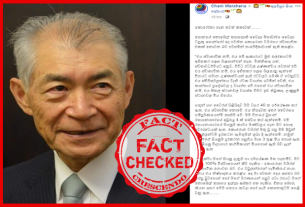On December 26, Netflix released the sequel to the 2021 global phenomenon, the Korean series “Squid Game.” Following Season 2’s release, social media posts went viral, claiming that “Squid Game” was inspired by actual events—specifically, a 1986 incident in South Korea where hostages were allegedly forced to participate in deadly games. Was there any truth to these claims? Let’s find out…
Social Media Posts
Social media users claimed that “Squid Game” was based on a real 1986 incident in South Korea. According to these posts, hostages were forced to play survival games in a bunker. The posts included alleged photos of the location and insisted this incident inspired the series.
Source | Archive Source | Archive
These claims were widely shared on other social media platforms as well.
Fact Check
Origin of Squid Game: Series director Hwang Dong-hyuk explicitly stated that Squid Game was inspired by his personal hardships and his observations of extreme socioeconomic inequality in South Korea. He drew additional inspiration from Japanese dystopian works like Battle Royale and Liar Game. After conceiving the plot in 2008, Hwang completed the script in 2009—more than a decade before the series’ 2021 release.
The show’s central premise—turning children’s games into deadly competitions—was designed to highlight capitalism’s brutal and dehumanising effects. Hwang focused on modern financial challenges as the story’s main themes, including debt, cryptocurrency, and real estate speculation. He noted that successfully balancing fantastical elements with real-world issues was crucial to the series’ impact. (Sources: Variety, The Korea Times)
Misleading AI-Generated Images: Investigation of the alleged “actual locations” using reverse image search and keyword analysis revealed that these images were created by Cityhermitai, an AI art creator. When the images went viral due to their resemblance to scenes from the popular series, the artist commented on his Instagram account that he was pleased to see the widespread interest in his work.
Comparison with Brothers’ Home incident: While many social media users have drawn parallels between the series and the Brothers’ Home incident, the creators have explicitly stated they drew no inspiration from historical events.
Brothers’ Home operated as a welfare facility in South Korea from 1975 to 1986, where approximately 40,000 people were detained under the pretense of receiving social services. The facility illegally confined its detainees, subjecting them to abuse, forced labour, and systematic violence. In 2022, a Truth and Reconciliation Commission report documented 657 deaths at the facility and revealed state involvement in these atrocities (Source: BBC, The Korea Times)
Summary

The claim that Squid Game was based on real events from 1986 is false. While the series draws inspiration from real social issues—inequality, competition, and desperation—the plot is entirely fictional and emerged from director Hwang Dong-hyuk’s creative vision. Moreover, the viral images purporting to show “real-life Squid Game locations” were created using AI.
Though the series wasn’t directly inspired by any historical events, including the Brothers’ Home incident, there are notable parallels between the systematic exploitation portrayed in the show and real-world human rights violations. The series powerfully reflects ongoing struggles against social inequality and human rights abuses.

Title:No, “Squid Game” Was Not Based on Real Events from 1986!
Fact Check By: Cielito WangResult: False






